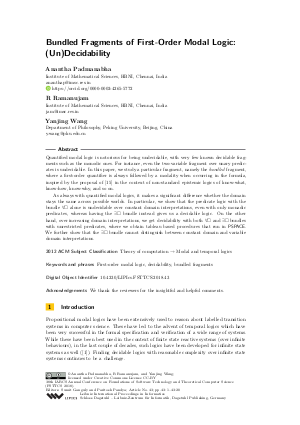Bundled Fragments of First-Order Modal Logic: (Un)Decidability
Authors
Anantha Padmanabha  ,
R Ramanujam,
Yanjing Wang
,
R Ramanujam,
Yanjing Wang
-
Part of:
Volume:
38th IARCS Annual Conference on Foundations of Software Technology and Theoretical Computer Science (FSTTCS 2018)
Part of: Series: Leibniz International Proceedings in Informatics (LIPIcs)
Part of: Conference: IARCS Annual Conference on Foundations of Software Technology and Theoretical Computer Science (FSTTCS) - License:
 Creative Commons Attribution 3.0 Unported license
Creative Commons Attribution 3.0 Unported license
- Publication Date: 2018-12-05
File

PDF
LIPIcs.FSTTCS.2018.43.pdf
- Filesize: 0.6 MB
- 20 pages
Document Identifiers
Subject Classification
ACM Subject Classification
- Theory of computation → Modal and temporal logics
Keywords
- First-order modal logic
- decidability
- bundled fragments
Metrics
- Access Statistics
-
Total Accesses (updated on a weekly basis)
0Document
0Metadata
Abstract
Quantified modal logic is notorious for being undecidable, with very few known decidable fragments such as the monodic ones. For instance, even the two-variable fragment over unary predicates is undecidable. In this paper, we study a particular fragment, namely the bundled fragment, where a first-order quantifier is always followed by a modality when occurring in the formula, inspired by the proposal of [Yanjing Wang, 2017] in the context of non-standard epistemic logics of know-what, know-how, know-why, and so on. As always with quantified modal logics, it makes a significant difference whether the domain stays the same across possible worlds. In particular, we show that the predicate logic with the bundle "forall Box" alone is undecidable over constant domain interpretations, even with only monadic predicates, whereas having the "exists Box" bundle instead gives us a decidable logic. On the other hand, over increasing domain interpretations, we get decidability with both "forall Box" and "exists Box" bundles with unrestricted predicates, where we obtain tableau based procedures that run in PSPACE. We further show that the "exists Box" bundle cannot distinguish between constant domain and variable domain interpretations.
Cite As Get BibTex
Anantha Padmanabha, R Ramanujam, and Yanjing Wang. Bundled Fragments of First-Order Modal Logic: (Un)Decidability. In 38th IARCS Annual Conference on Foundations of Software Technology and Theoretical Computer Science (FSTTCS 2018). Leibniz International Proceedings in Informatics (LIPIcs), Volume 122, pp. 43:1-43:20, Schloss Dagstuhl – Leibniz-Zentrum für Informatik (2018)
https://doi.org/10.4230/LIPIcs.FSTTCS.2018.43
BibTex
@InProceedings{padmanabha_et_al:LIPIcs.FSTTCS.2018.43,
author = {Padmanabha, Anantha and Ramanujam, R and Wang, Yanjing},
title = {{Bundled Fragments of First-Order Modal Logic: (Un)Decidability}},
booktitle = {38th IARCS Annual Conference on Foundations of Software Technology and Theoretical Computer Science (FSTTCS 2018)},
pages = {43:1--43:20},
series = {Leibniz International Proceedings in Informatics (LIPIcs)},
ISBN = {978-3-95977-093-4},
ISSN = {1868-8969},
year = {2018},
volume = {122},
editor = {Ganguly, Sumit and Pandya, Paritosh},
publisher = {Schloss Dagstuhl -- Leibniz-Zentrum f{\"u}r Informatik},
address = {Dagstuhl, Germany},
URL = {https://drops.dagstuhl.de/entities/document/10.4230/LIPIcs.FSTTCS.2018.43},
URN = {urn:nbn:de:0030-drops-99424},
doi = {10.4230/LIPIcs.FSTTCS.2018.43},
annote = {Keywords: First-order modal logic, decidability, bundled fragments}
}
Author Details
References
-
Parosh Aziz Abdulla, Karlis Cerans, Bengt Jonsson, and Yih-Kuen Tsay. General decidability theorems for infinite-state systems. In Logic in Computer Science, 1996. LICS'96. Proceedings., Eleventh Annual IEEE Symposium on, pages 313-321. IEEE, 1996.

-
Francesco Belardinelli and Alessio Lomuscio. Interactions between knowledge and time in a first-order logic for multi-agent systems: completeness results. Journal of Artificial Intelligence Research, 45:1-45, 2012.

-
Egon Börger, Erich Grädel, and Yuri Gurevich. The classical decision problem. Springer Science &Business Media, 2001.

-
Gisèle Fischer-Servi et al. The finite model property for MIPQ and some consequences. Notre Dame Journal of Formal Logic, 19(4):687-692, 1978.

-
Melvin. Fitting and Richard L Mendelsohn. First-order modal logic. Synthese Library. Springer, 1998.

- D. M. Gabbay and V. B. Shehtman. Undecidability of Modal and Intermediate First-Order Logics with Two Individual Variables. J. Symbolic Logic, 58(3):800-823, September 1993. URL: https://projecteuclid.org:443/euclid.jsl/1183744299.
-
Kurt Gödel. Zum entscheidungsproblem des logischen funktionenkalküls. Monatshefte für Mathematik und Physik, 40(1):433-443, 1933.

-
G. E. Hughes and M. J. Cresswell. A New Introduction to Modal Logic. Routledge, 1996.

- Roman Kontchakov, Agi Kurucz, and Michael Zakharyaschev. Undecidability of first-order intuitionistic and modal logics with two variables. Bull. Symbolic Logic, 11(3):428-438, September 2005. URL: http://dx.doi.org/10.2178/bsl/1122038996.
- Saul A. Kripke. The Undecidability of Monadic Modal Quantification Theory. Mathematical Logic Quarterly, 8(2):113-116, 1962. URL: http://dx.doi.org/10.1002/malq.19620080204.
- Mikhail N. Rybakov and Dmitry Shkatov. Undecidability of first-order modal and intuitionistic logics with two variables and one monadic predicate letter. CoRR, abs/1706.05060, 2017. URL: http://arxiv.org/abs/1706.05060.
- Krister Segerberg. Two-Dimensional Modal Logic. Journal of Philosophical Logic, 2(1):77-96, 1973. URL: http://www.jstor.org/stable/30226970.
-
Moshe Y Vardi. Why is modal logic so robustly decidable? Technical report, Rice University, 1997.

-
Yanjing Wang. A logic of goal-directed knowing how. Synthese, 2017. forthcoming.

- Yanjing Wang. A New Modal Framework for Epistemic Logic. In Proceedings Sixteenth Conference on Theoretical Aspects of Rationality and Knowledge, TARK 2017, Liverpool, UK, 24-26 July 2017., pages 515-534, 2017. URL: http://dx.doi.org/10.4204/EPTCS.251.38.
-
Yanjing Wang. Beyond knowing that: a new generation of epistemic logics. In Jaakko Hintikka on knowledge and game theoretical semantics, pages 499-533. Springer, 2018.

- Frank Wolter and Michael Zakharyaschev. Decidable Fragments of First-Order Modal Logics. The Journal of Symbolic Logic, 66(3):1415-1438, 2001. URL: http://www.jstor.org/stable/2695115.
